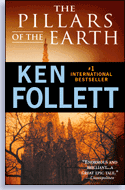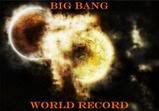Tuesday, March 10, 2009
 One day after Halloween, in the year 1327, four children slip away from the cathedral city of Kingsbridge. They are a theft, a bully, a boy genius and a girl who wants to be a doctor. In the forest they see two men killed.
One day after Halloween, in the year 1327, four children slip away from the cathedral city of Kingsbridge. They are a theft, a bully, a boy genius and a girl who wants to be a doctor. In the forest they see two men killed.
As adults, their lives will be braided together by ambitions, love, greed and revenge. They will see prosperity and famine, plague and war. One boy will travel the world and come home in the end; the other will become a powerful corrupt nobleman. One girl will defy the might of the medieval church; the other will pursue an impossible love. And always they will live under the shadow of the unexplained killing they witnessed on that fateful childhood day.
World Without End is the sequel to Pillars of the Earth. However, it doesn't matter which you read first. The second book is set in the same town, Kingsbridge, but takes place two hundred years later, and features the descendants of the original characters.
Labels: book review, ken follett, middle ages, world without end
Sunday, February 22, 2009
 In a time of civil war, famine and religious strife, there rises a magnificent Cathedral in Kingsbridge. Against this backdrop, lives entwine: Tom, the master builder, Aliena, the noblewoman, Philip, the prior of Kingsbridge, Jack, the artist in stone and Ellen, the woman from the forest who casts a curse. At once, this is a sensuous and enduring love story and an epic that shines with the fierce spirit of a passionate age.
In a time of civil war, famine and religious strife, there rises a magnificent Cathedral in Kingsbridge. Against this backdrop, lives entwine: Tom, the master builder, Aliena, the noblewoman, Philip, the prior of Kingsbridge, Jack, the artist in stone and Ellen, the woman from the forest who casts a curse. At once, this is a sensuous and enduring love story and an epic that shines with the fierce spirit of a passionate age.
+++++++++++++
In fact, Europe in the year 1000 was one of the world's more stagnant regions—an economically undeveloped, intellectually derivative, and geo-politically passive backwater.
Three short centuries later, all this had changed dramatically. A newly invigorated cluster of European societies revived city life, spawned new spiritual and intellectual movements and educational institutions, and began, for reasons both sacred and profane, to expand at the expense of neighbors who traditionally had expanded at Europe's expense.
Ken Follett has filled memorable details as he unfolds this story.
The novel treats medieval society: the warrior aristocracy of knights, castellans, counts, and dukes; the free and unfree peasants whose work in the fields made the existence of medieval society possible; and the townspeople, the artisans and merchants who represented the newest arrivals on the medieval scene.
It examines the intellectual and religious history of early medieval Europe. You study monks and the monastic life, charismatic preachers, and theologians. You examine the lives of those who found themselves outside the religious mainstream, especially the heretics and Jews of early medieval Europe.
Also it discusses partly the major political developments and events between 1000 and 1300, including the First Crusade, the Norman Conquest of England, and the granting of Magna Carta.
Labels: book review, ken follett, middle ages
Monday, February 9, 2009
 Cal realizes that once this book is published that he may become the most famous hermaphrodite in history, and he names a few of the other historically famous hermaphrodites. Cal then goes into an argument that he is a better case to study because he was born with a brain chemistry of a male but raised as a girl. Therefore, his situation is a great study of nature versus nurture.
Cal realizes that once this book is published that he may become the most famous hermaphrodite in history, and he names a few of the other historically famous hermaphrodites. Cal then goes into an argument that he is a better case to study because he was born with a brain chemistry of a male but raised as a girl. Therefore, his situation is a great study of nature versus nurture.
Cal then rewinds the story once again to the summer of 1922. The story begins on the slope of Mt. Olympus in the Asia Minor with Cal's grandmother Desdemona. While working in her silkworn cocoons, she is sure that she feels her heart skip a beat. This feeling will be the genesis of her always feeling ill inside a perfectly healthy body.
Labels: book review
Saturday, January 31, 2009

I was born twice: first, as a baby girl (Calliope), and then again, as a teenage boy (Cal), and so begin Jeffrey Eugenides's second novel, Middlesex. He won the Pulitzer Prize for the novel, and also he is the bestselling author of The Virgin Suicides.
Writing his story is yet another birth, which is now taking place...Three months before being born, his grandmother held her magical spoon over her mother's pregnant belly. The spoon swung from north to south, foretelling the birth of a son. Cal's mother, Tessie did not believe her mother-in-law's prediction and believed so strongly that a baby girl would be born that she already had the name Calliope picked out. Tessie and Milton, Cal's father, was so desirous to have a daughter that they had determined to do whatever it took to have a girl.
Topics to discuss...
- The author's chosen point of view. Do you believe this story could be told in another point of view? Would it be as effective?
- What part does the choice of setting the story in mid-west Michigan, specifically Detroit and Grosse Point play in the story?
- How important to the story is Cal's being a hermaphrodite? How similar would this story be had Cal not been a hermaphrodite?
- Why does the author choose to never introduce Chapter 11's given name?
- Discuss the author's purpose in including flash-forwards in Cal's present life in Berlin? How would the story change without the flash-forwards?
Labels: book review
Friday, January 9, 2009
Labels: book review
Wednesday, January 7, 2009
Labels: book review
Tuesday, January 6, 2009
Labels: book review
Labels: book review










































